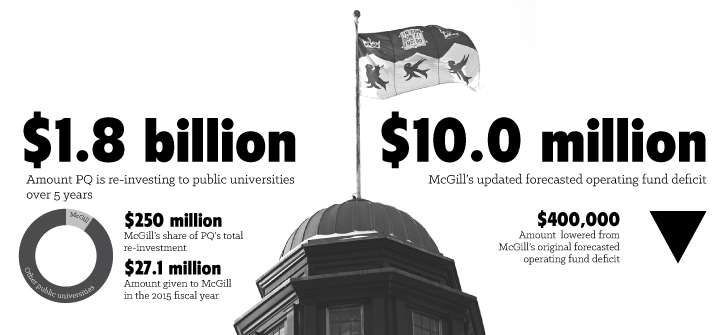Rules regarding professor adherence to exam weight may stay the same, despite student concerns raised at the Feb. 19 Senate meeting.
Deputy Provost (Student Life and Learning) Ollivier Dyens responded to questions raised by student senators as a result of a motion passed at the Winter General Assembly of the Students’ Society of McGill University (SSMU).
The question demanded improved adherence and visibility to requirements in the university’s Student Assessment Policy. For example, it cited the rule that a final examination cannot comprise more than 75 per cent of a student’s grade, and that any examinations constituting more than 50 per cent of a course grade must take place during the final examination period.
Dyens acknowledged that professors’ compliance with the policy may have depended on varied interpretations of the rules. He also stated that justifiable exceptions to the policy already exist, and that any other exceptions could be brought to the administration.
“Justifiable exceptions are already built into the policy,” the response reads. “As long as students have been informed well ahead of time, usually prior to the end of the add/drop period, a final exam worth more than 75 per cent of the final grade is permitted and can be scheduled.”
Cameron Butler, Macdonald Campus Students’ Association representative, said that despite such justifications for exceptions, students continued to feel that greater adherence to the policy was necessary.
“I took linear algebra—MATH 133—which is a required course for science and engineering students, and that course’s final was 85 per cent,” Butler said. “It’s a required course for freshman students in first semester where they have a final that is virtually their entire course [….] There isn’t the choice to drop that course because you think the evaluation is unreasonable.”
Although the question from SSMU proposed the mandatory inclusion of relevant sections of the assessment policy on course outlines, Dyens said he was hesitant about taking this course of action or making promises.
“We’re going to wait before we inquire on whether that is the best policy or not,” Dyens said. “The course outline is already long enough. We don’t want a course outline that goes on for 20 to 28 pages, because it defeats the purpose—people don’t read it.”
Discussion on Interdisciplinary Research
Interdisciplinary research collaborations were the topic of another discussion at Senate. Two main focuses included obstacles and barriers to interdisciplinary learning, teaching, and research, as well as practical steps for McGill to promote interdisciplinary collaborations.
Numerous senators touched on their personal experiences and offered a range of proposed resolutions.
“The biggest obstacle in my experience is a lack of awareness of what other people are doing in the topic that you’re interested in,” Sean Ferguson, dean of Schulich School of Music, said.
Political Science professor Catherine Lu proposed ideas for removing such obstacles.
“Interdisciplinary research is actually very difficult to do,” Lu said. “I trained in a specific field, and I feel like I need a whole lifetime plus another lifetime to get to know [another….] I have a suggestion about incentivizing people for pursuing for obviously intellectual reasons, but also for the institution to provide support [….] One thing to be done may be team-teaching, and giving rewards or at least not creating barriers to [interdisciplinary research].”
Budget
Provost Anthony Masi presented further developments to the 2015-2019 projected budget.
He unveiled an estimated value of $27.1 million—the provincial government’s forecasted reinvestment in the university for the 2015 fiscal year. The new number is McGill’s share of the total $1.8 billion to be invested into provincial universities in the next five years.
“The Quebec Government has announced a reinvestment for universities over the next five years,” Masi said in his presentation. “In theory, that should provide $27 million in our budget next year. Now, [there was] an ongoing $19 million cut in our budget, so this looks like progress.”
Masi also presented an updated deficit value, which had dropped to $10 million, compared to the $10.4 million proposed last Fall.
PPP Protest
Outside of senate, several members of the McGill community held a demonstration demanding increased transparency on the People, Processes, and Partnerships plan (PPP).
Set to come into effect on May 1, the PPP aims to centralize 13 departments in the Faculty of Arts into four administrative service centres.
Protesters distributed copies of a letter addressed to Principal Suzanne Fortier to attendees of Senate, which stated that Dean of Arts Christopher Manfredi had ignored the community’s objections to the PPP.
“We believe Dean Manfredi is steamrolling the PPP over the concerns raised by faculty, students, and staff,” the letter reads. “In addition, he has disregarded evidence that the PPP is harmful rather than helpful. Dean Manfredi’s actions have eroded our confidence that he is acting in the best interest of the faculty.”
Gretchen King, a graduate student in art history and communication studies, said Manfredi’s lack of transparency throughout the process has created a tough situation for academic support staff.
“The PPP creates new positions—new managerial positions—but we don’t know what those job descriptions are,” she said. “We only anticipate absolute failure in a situation in which staff are being overworked, and we staunchly oppose that.”
In addition, King said Manfredi had not consulted unions of affected workers.
“We ask you to support our request that the Dean create a democratic process and respond to the following demands: [to] release the details—including budgets, job descriptions, alternative plans, and process mapping—on the PPP website [and to] respect and act in accordance with the collective agreements of affected workers,” the letter reads.
Another protestor, Cayley Sarochan, a graduate student in art history and communications studies, said the protest was also held to point out larger issues in the decision-making process of the university.
“One of the main reasons this is important is because it’s also an issue of democratic governance in the university,” Sarochan said.









